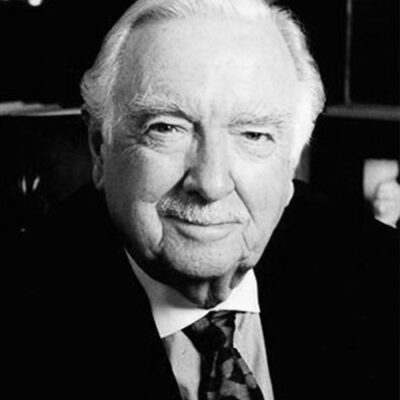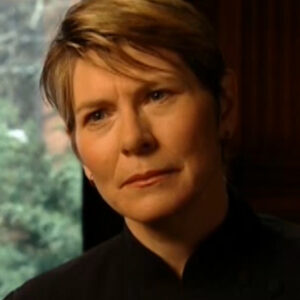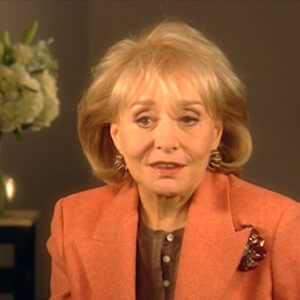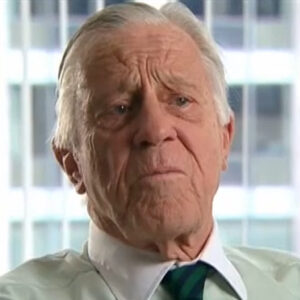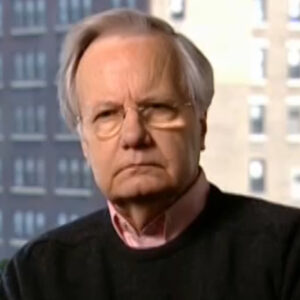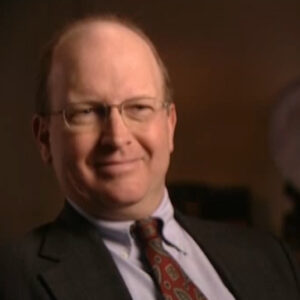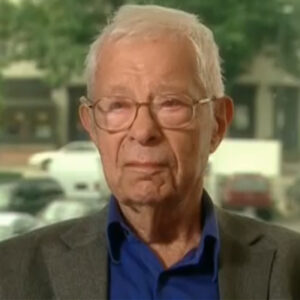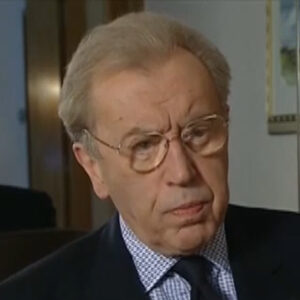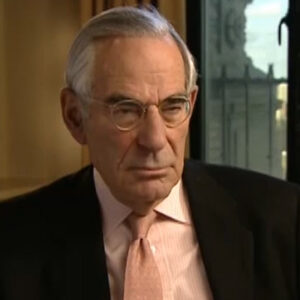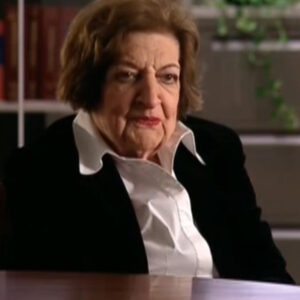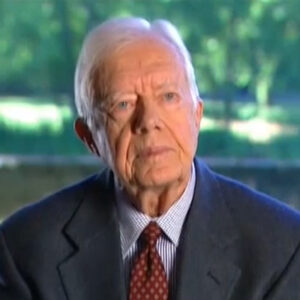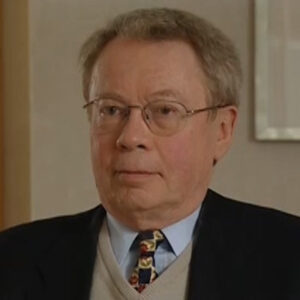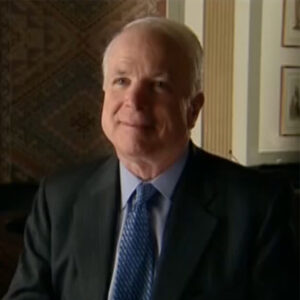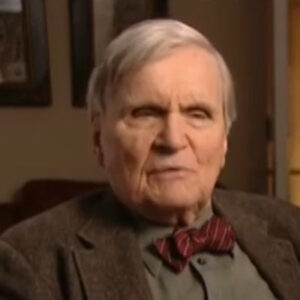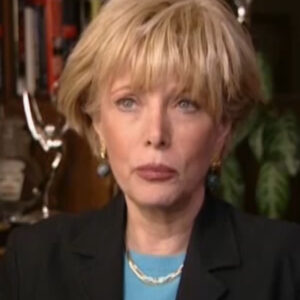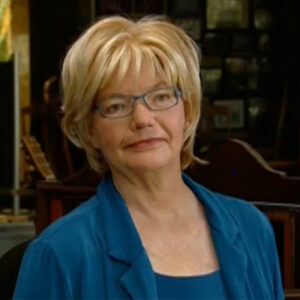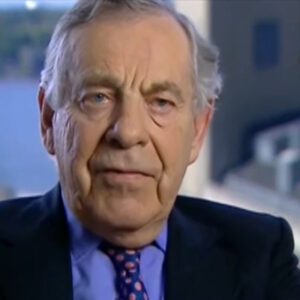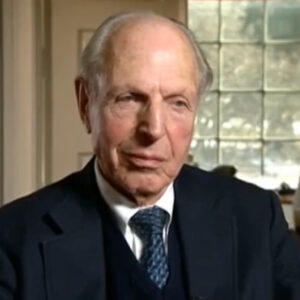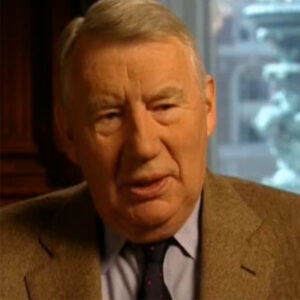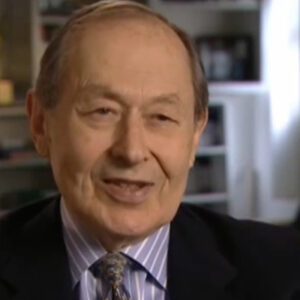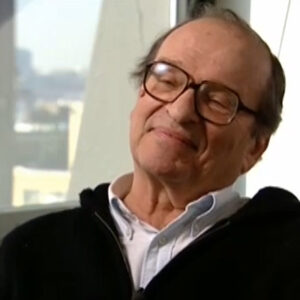Speaker We were living in Washington at the time and Walter and Betsy had just moved. Well, they had been in Washington, but they just been hired by CBS. He was a print man and he did a radio show for a conglomerate of stations out in the Midwest. But he finally came over to CBS. So he was the new man on the team. And we met him and fell in love with both of them immediately. And that was the beginning of a very beautiful friendship and collegial relationship.
Speaker Mr. Wershba, was that the first time you met Walter?
Speaker I’m trying to remember the first time. What I remember listening to him for the first time, he’d come up. I think he came up to New York on Sundays and did a program there. Anyway, I got to work with him on a program called. Oh, what was the name of that thing that The Washington Post people in the Post? The Post owned 51 percent of the Washington station WTOP. So I would look through the Post in the morning and see who might be a good interview. I call him up and ask him to come on the program. Now, Walter was the boss of that program. He was the boss anywhere. He was. Remembering that he introduced the word managing editor of the evening news. Cronkite added managing editor. I have to understand that he came out of newspapers. He came out of wire service. United Press, a managing editor, was God, since somebody had in trifle with somebody, even try to persuade was on your side. He will see the thing the way you would see it. And he was managing and he was managing editor also of this little program, so-called.
Speaker I was in it, I think, from about 1950 to about 53. Walter would come on and he would be the star.
Speaker He would ask report the news. He would do one minute correction. He would do nine minutes for the entire news program. And he would.
Speaker He was terrific. You know, he’d come in. He was the newsman in those days. They didn’t call them anchor man, but he was the lead man and he delivered all the news, but he didn’t have a teleprompter. That was the amazing thing about him. He had notes on a little index cards with key words and he’d take a look at that. And you know what the story was going to be. And he would say it almost, you know, extemporaneously. And if there were pictures or maps or things that had to be shown, they would be shown on a wall behind him. And and then he would throw it to the weather man or the sports man or to Joe, who did a live interview every night from people in the post. But I believe it was a local news program, WTOP, which at that time was partially owned by CBS and partially by The Washington Post. That’s why they called it People in the Post.
Speaker All right. Tell me, Mr. Wershba, a little more, because just to know a little more about this interview piece that you did on the show. What exactly was that?
Speaker Well, I would have anybody who lived in Washington, D.C., you know, made his way to the front page of The Washington Post or the inside page. And I want our senators or congressmen or agency people.
Speaker And it was really a delicious thing and I find it delightful, easy to do because these people were all pros. Everybody knew how to talk.
Speaker And the method of Wahler had for his news program was to take that one sentence that Shirley talked about. I that one sentence and build the whole show because he had to go down the line of nine or ten big stories. He had to go down as they were prepared before he went on the air. That is prepared by the editor. It’s got to be this way or else we’re going to lose the whole thing. This was a work of art to do that. When I saw him, he was the managing editor. I mean, he was gone on the program and he carried out to the same length when he became not so much because of his manner, but because everybody respected him and he knew what he was doing.
Speaker He knew news values. And when he said, this is our lead story, that was the lead story. And nobody would quarrel with that because he was right.
Speaker Yeah, well, he might he might quarrel with people.
Speaker Some people really not when I was around. You were assuming you from.
Speaker Now, do you think that part of that skill that he had. Came because he was a wire service man, that he sort of knew how to get the story. Tell me a little bit about what you think that the experience of being.
Speaker Well, I. I think Joe asked him at one point, how can you remember everything? You know? You know, you could just one line on an index card. And he told Joe that he had had practice in that one. He was the head of a bureau, Joe, right? Yeah. He was the head of the bureau. And his managing editor would come and say, what’s the what was the word they used to leave? What are the stories?
Speaker And he would then have to tell his managing editor what was big story tonight and why. And I had to be good. Otherwise, I would say, you know what you’re doing.
Speaker Yeah. Now, you both were considered part of the Murrow Group. Mm hmm. Tell me a little bit about that experience of working with Murrow. And what’s the difference? Was there a difference between.
Speaker They murro the way Myrl was running things, and then once Walter took took over the evening news.
Speaker Oh, that was a whole.
Speaker Murrow and Cronkite were never. In competition at this point, Morrow said there.
Speaker You know what I mean? What was it? Why was it that you were considered part of the Murrow was in the Murrow?
Speaker Edward R. Murrow was the correspondent from World War Two. There’s no question about that. And when the war was over and he came back to the United States and they made him a vice president, which he hated, and then he went back on the air primarily well, exclusively at that point in radio. And he was the best there was. And anybody that was tapped to work with him, whether in radio or when he later on move to television. Well, it was like being appointed to the Honor Society in school. It was being part of the in crowd. And that’s the way it went. And that came upon us suddenly, I think, when when he left and then Walter became the lead man, the face of CBS News. That happened much more gradually. But to get to be on the evening news, whether as a desk assistant or it was the same thing. That’s where you wanted to be. It was the Arista, the, you know, honor society of the club. So you had arrived if you got there.
Speaker Murro Murro is the closest thing to a journalistic God that anybody who ever worked for you came in already prepared. Yes, Master. What can we do for you? He had a second master in reserve and that was Fred Friendly. Fred Friendly did not throw flowers out to the people who worked for him.
Speaker He grabbed them by the lapel and said, Listen, I want this and you better bring it in properly. What does this mean? You know, when people say you worked for Ed Murrow and you take a gulp and say, yeah, I worked for Fred Reilly, who told me what Ed Murrow wanted because that was what Fred wanted to get an elucidation of what the story was about. And there was a rivalry, not a rivalry, but.
Speaker And not just an antagonism of any sort of any proportions between Murrow and Walter, hired Walter Murrow, hired Walter and expected him to come to work in Europe. During the war, because Walter had made his reputation also amongst journalists and reporters, writers and so forth. And when Walter, what to see the United Press boss and said, I’m leaving. What are you leaving for? I’m going over tomorrow. What are you talking about? I’m talking about a few bucks more than I’m making here at the United Press. We’ll give you a few more bucks. Stay here. Morrow goes back. Cronkite goes back to moralizer.
Speaker They need me there. I think I’d better go over because I need the money. My wife is with me. We’ve got kids coming and going. And. Murrow never forgave him for that. He’d get enough or Walter was in Washington and making another reputation there. And he agreed to go to Korea. That he got tangled up or career will. And he would have done beautifully there.
Speaker And he he he was so good that CBS and the stations that backed him wanted him in Washington. So once again, Murrow probably saw the sunroof fool me once more.
Speaker And that’s the last time they hired him for each other.
Speaker Rooters when when Cronkite was hired for CBS, finally. And they took the job and left United Press and left the radio stations. It was with the understanding that he was gonna go off to Korea. And while they were getting ready for that, he went on the air locally and he was so darn good that they didn’t want to let him go. He didn’t last too long as a local man. Once the network saw how good he was, they whisked him up to New York and immediately put him on the air there.
Speaker And then and then he became the network anchor was the one who was the managing editor. He played his lines close to the chest. You couldn’t really try to seduce him into accepting something that was better than the best. When he was off. The Daily. Rat race renews and could relax a bit.
Speaker He was the warmest kind of guy he was with the best sense of humor that you’ve heard outside of a standup comic.
Speaker Well, a sense of humor belonged to his wife.
Speaker Wow. Yeah, they were. But she was as smart as Walter was. She was more beautiful than Walter. Walter was pretty good looking, Joe. I know. From a woman’s point of view. Yeah. Yeah. He was Melvyn Douglas. Oh, Melvin Douglas said the story. Melvin Douglas is jealous.
Speaker No doubt I’ll look anything like Walter Cronkite when I wonder, do I look like anything? Well, no, I didn’t want to wreck my own newspaper.
Speaker But.
Speaker Let me ask you to follow up on something you were saying. Was was Walter a bit temperamental when he was the managing editor working on preparation? Was he? I mean, I heard that he sometimes threw pencils, and that was right.
Speaker Friendly’s forte. He threw pencil. He broke pencils in between those two. Oh, Walter was firm.
Speaker My room with an arched. I could turn your blood, cement, water.
Speaker You know what? Walter was a straight newsman on the air for which I respect him. And now and always, he didn’t fool around with the news. There was you know, he wouldn’t make compromises on the news off camera. He was the most delightful social compact and still is that you can ever spend an evening with. Always had a great joke to tell. Always a wonderful sense of humor, warmth, friendly, everything. But on the air, he was a completely neutral newsman. The only time we ever saw him put the neutrality aside was when he went to visit Vietnam and came back and said.
Speaker This is an unwinnable war.
Speaker And he labeled it as editorial. He was giving opinion, otherwise he never did. We never knew what his politics were. I couldn’t I couldn’t tell you.
Speaker And moreover, he morrows the same way. The Democrats trying to get more run for senator in New York State.
Speaker Will they try to get Walter to run for president? He doesn’t believe a newsman should ever run for political office for the simple reason that it would then denigrate his entire career as a newsman. And I admire and respect that.
Speaker Well, let me ask you to pick up on Vietnam. He crossed that line in Vietnam. Tell me, was that I mean, was that a very difficult thing for him to do? Because he had been so much the straight man right down the middle and you didn’t know exactly where he stood on things?
Speaker I would say it was one of the hardest decisions that he felt he had to make to cross the line on the Vietnam question. And he did not do it easily. He didn’t do it lightly. I think he thought long and hard about it and then decided that this was something that the American public had to know. And as a reporter, it was his job to tell him.
Speaker I remember we’re talking about a period from I have to stop.
Speaker Because I’m sort of trying to listen and follow where you’re going with the conversation, you’re covering a lot of the questions that I have.
Speaker Yeah, listen, Joe, this is not a story about Murrow or Fred Friendly. It’s a story about Walter Cronkite.
Speaker But I mean, I think it’s really important to the comparison context. And I’m actually gonna follow up on another. Okay. So we have speed. Mr. Hersh, by you were about to say something about Vietnam.
Speaker I was going to say this about the whole picture, that period by period. That’s where I’m coming to. Why are you so quick to put your staff on the ground? No, I want you to leave in the downgrading of faces. For how many years is it to me?
Speaker Thank you. Excuse me.
Speaker This is a period from the end of World War Two. Down through the Cold War. Period. Nobody was certain you would have a morning to get up for with the atomic bombs that the Russian communists had and that we had.
Speaker At that time, there was a policy at CBS which continued for years after. You do not take sides. And you don’t go into how you feel something about something. We have an analysts, commentators, et cetera, who can do that job.
Speaker Now, when Murrow shows me one friendly correction again. When?
Speaker Walter made his declaration standing outside next to a jeep, I think it was in Vietnam. It was remarkably tolerant of anybody else’s opinion. He knew he was sticking his neck out. He was going to lose stations who support him all along. And he said it was more important that we get a straight picture. This was after he had talked to military men galore. When he was over there, it was an unwinnable situation and there was no sense for us to keep.
Speaker Pouring troops into that great war of disaster and death.
Speaker When Murrow took on Senator McCarthy, Joseph McCarthy, he, too, faced this business of. That’s an opinion of yours. And he went to great lengths to say, this is my opinion and we give the heir to the senator. The answer is so he wants to. At every stage of the game, the policy of CBS was no commentating, no commentary. I have something that fits into that. I met Walter outside of the U.N., the United Nations building.
Speaker I don’t know, 54, 55. He was being very persuasive about what he would do in the situation that we found ourselves in the Cold War of possible nuclear war. They said, you know, what we should be doing is unilateral disarmament.
Speaker Tell them we’re not going to use a. Bombs and put the bombs where everybody could see them. I said, Walter, because there was always a pacifier. I hope you don’t make this speech to the ladies group out in Arkansas.
Speaker As you know, have your has. Nobody was gonna to surrender. And nobody was thinking ahead of what was the alternative to surrender, because we did reach that stage and sixty one, two or three where we almost employed. Nuclear weapons. And the Russians. Khrushchev was prepared to do the same. The madness. Pure madness. Even today, just to bring it up. It’s probably still madness. But more people are in the game now and you don’t know who the madman. Saying we know, but we were never too sure that we agree with some of the Muslim spokesmen that maybe it’s we were mad. We were all nuts.
Speaker Well, I wanted to pick up on something you said about the Joe McCarthy Meraux and Joe McCarthy. Murrow did. Do you feel like there was a little bit Cronkite was brought into the town to be kind of the Antine Myrl, that is. Did management think that Cronkite would tone things down from the more controversial and flashy Murrow days?
Speaker The timing is off. No, Murrow. Cronkite came in in the 50s. Before Murrow took McCarthy on, and so there was no nothing like that.
Speaker Do you think I’m wrong? Give me that again.
Speaker Was was Walter brought in to kind of tone down what Murrow was doing? There was no see it now at the time Walter came to CBS.
Speaker I’m saying if this was I mean, he came after Joe McCarthy. He was not he was not reporting at CBS during the period. But my question is, is that that obviously caused quite an uproar when when Murrow reported on McCarthy in his report. So my question is, in a way, was there a bit of shift of administration, in a sense, to sort of tone Murrow down and bring in.
Speaker Cronkhite to sort of. Calm things down and take a more.
Speaker Cronkite joined CBS in 1951. Murrow didn’t even have see it now at that time. He wasn’t on television.
Speaker He was doing the scene.
Speaker Now we see it now began. It was like a 60 minute show, you know. They were doing interesting stories, but not really controversial. They didn’t really begin to do. The first really controversial piece they did was the case of Milo Radulovich. And that was then, what, up tober in 1953. So I don’t think there was any kind of relationship there with them.
Speaker This is the first time heard about resigning. You would have to go to Bill Paley and ask him why they brought him. William S. Paley, the head of CBS, wanted somebody strong in the evening. They had a very good man who was doing what was in them. What I get with Doug, I was was doing it very nicely. I had no strength behind it. So Palin on the others on his level. So we got to find somebody.
Speaker And what about this new guy that we’ve heard on television was in its toddler stage at that time? You know, not infancy, because that really began right after the war. When was the first television news program that Doug Edwards did? It had to be around 1949 or 1950.
Speaker So I don’t see any relationship between the fearlessness of a Murrow and taking on controversial couldn’t it couldn’t possibly be the tone him down because Murrow was coming in with his own program as one of the directors of newsrooms to say there are two news departments here. One is there’s regular news department that we have and the other one is Edward R. Murrow. And see it now.
Speaker And Cronkite did not go to the evening news immediately. You know, he. That’s right.
Speaker No more dead eyewitness to history and a lot of other things before he took over the evening news when it was a 15 minute newscast. So I. I would not think that this is a particularly.
Speaker And and the minute that Cronkite was seen as faltering in the ratings for more than what he called the conventions, the conventions.
Speaker He got out now. Fred Friendly told me that palely was on his way.
Speaker He wanted Bob Trout back. Why are you trying to get Walter out? And when I told at the wall when they in the hallway, he says it was Fred.
Speaker Well, see, everybody has because of the competition I’ve had.
Speaker That’s right. They came on and, you know, it was my Tweedle Dee and Tweedle Dum playing off each other. And it was a cute little act. And so it got a lot of attention. Walter was telling it straight.
Speaker Can you phrase that so we know what you’re talking about?
Speaker Yes. Yeah. Yeah. OK. The 1952 convention when Walter was the rising star and he was the anchor man for the convention, the first one. Anyhow, NBC came up with the Huntley and Brinkley. It was kind of a pick and pat routine and it got very popular, you know, and got better ratings. And so the way I have heard the story told Paley said to Fred Friendly, who at the time was president of CBS News, get Bob Tripe back. He had been there anchor at conventions for so many years. All right. He was wonderful. He really was. And and move Cronkite, Walter aside. So for the second convention, it was Bob Trout. And then they had Murrow was kind of a commentator and the Holton’s nothing helped and it didn’t do any good. And by the next convention, Walter. It was back. I think he was brilliant at it.
Speaker And Cronkite. Cronkite handled himself as a gentleman always and as a peer. Don’t talk down somebody who’s had that job before. Well, that’s right.
Speaker And that’s true. He’s a class act. Every weight class in every respect. And Murrow never can tell me we love Murrow.
Speaker Never allowed himself to sort of remark about how many times Warner had failed.
Speaker I never heard any backbiting. Of course, I wasn’t with them all the time, but I never heard any backbiting from either Murrow or Cronkite or anybody else that I really respect.
Speaker Now, we interviewed Don Hewitt this morning. Yes, and he said that the. Metro gang, sort of. And he wasn’t being sort of mean about it.
Speaker He said that you guys were a little bit snobby. You were your backgrounds were very you know, you were a lot of Oxford graduates. I mean, you’re very smart group of well educated people.
Speaker If he wants to give a sort of diploma from Oxford, that’s fine. But Joe and I went to Brooklyn College at different times, but we went to Brooklyn College and never graduated. I flunked every Jesse Zastrow, who was Murrow’s main man, went to Ohio University. And let’s see, what did Johnny Irwin go? He may have gone to Columbia. I went to the bar. That was. No. That was somebody else. That was Eddie. Eddie. I don’t know whether he was ever, you know, snobby. Well, we were in the Honor Society. So maybe that’s what Don interpreted, you were in the honors. Well, this was the place to be the epitome of recognition for your talents as a journalist as it was. And Cronkite’s day when when he took over the evening news. That’s where you wanted to be.
Speaker Let us not forget that the phrase the most trusted man.
Speaker Yeah. Adhered to Walter.
Speaker El.
Speaker What does he Leland. Leland, right. Walter, it was the most trusted man. And still is when you listen. Yes. When you listen to him with the news, there was no fancy stuff, was straightforward, and you could put your bet down on the bar that that was the way it was. And so when he said and that’s the way it is, despite all the purists in the audience who said that’s not the way it is.
Speaker It’s only part of it.
Speaker Well, he felt that way about it, too. You know, when he said it, he said, oh, you know, that that sounds so pompous. But I think I was disappointed and I’ll keep it.
Speaker Keep it. I love it.
Speaker That’s the way part of it is that it was this you know, there’s always been some talk that Walter was temperamental and would lose his temper. He was demanding, as rightly he should be, because it was his face hanging out there. Right. And if you gave him misinformation or not enough information, he would have to take the blame for it, and rightly so. So he insisted that everybody do the job properly, given the correct information. Do all the research, check and double check. And if if that’s temperamental, that’s what I want. That’s who I want. Telling me what’s happening in the world today.
Speaker He was the quintessential managing editor. Yes. He had to take the blame. And he did.
Speaker Now, both of you both were very you were you really saw the birth thing of television now. Was there a feeling because a lot of you came out of radio. Was there a feeling that somehow television. Did you look down on television when it first came out or did you feel like it wasn’t? I mean, how did you feel about this technology that was coming?
Speaker I always welcome everything new. Welcome television. I wasn’t sure that it was going to have as much impact in the early days because how many people had television sets? And that’s the way every new medium is judged when it first comes out. Well, it shows a lot of promise. It’s drawback was that you couldn’t just tell a story. You had to have pictures for a story and that might limit your ability to do the job. Right, that you couldn’t tell every. And then you went for pictures because that would attract people. So there were drawbacks and you had reservations. But I would always want to get into the new kid on the block.
Speaker I helped a young man name unknown because I’m in one of my senior moments. Work on a thesis that television really began about 48. And would have flourished at Edward R. Murrow placed his premature. On the work and at morrow did not support it. And that’s what killed the efforts of the young people, the new people to make. Television, an important force in American news. I don’t know how true.
Speaker Why is it that you say that Merle wouldn’t put his arm?
Speaker He he the fellow wrote his thesis, says he just said that there is some truth to it because it was no good.
Speaker Now, I think early on, Murrow was a man of words. And he didn’t feel that there was room in television in the early days, there wasn’t to tell a story with all its nuances in words cause you were going to be dependent on pictures. Other people felt that way. They will reluctant to go into the new medium. They were making a lot of money from commercials and in radio and to go into a brand new medium that not many people were watching because they didn’t have television sets was risky. You know, you have to give up a bird in hand and go look for the one in the bush.
Speaker I think that was the problem. Doug Edwards.
Speaker But he was courageous.
Speaker He took he took that job even though it meant a cut and his income because he saw the future. And if he had had the kind that Murrow had, then national television could have been on a couple of years before it began to.
Speaker You know, it’s the same thing as when when movies first went to talkies or when talkies first came to movies. You didn’t know how you’re going to be received. And suppose you weren’t the handsomest kid on the block and you didn’t photograph well and your voice didn’t project well. And, you know, your persona didn’t appeal. Your career was ended. Whereas in radio, if you had made it there, you’d made it. So there was fear to go in. I wouldn’t blame Murrow for it.
Speaker And I think whatever this fellow who wrote the book said, you can’t blame Murrow for that unless his reluctance to make the change led other people who were his followers to have the same reluctance. But that’s that’s kind of far fetched, don’t you think?
Speaker Take the opposite side. The minute the Murrow admitted to going into television, everybody wanted to go in.
Speaker Well, with Murrow. Yeah. Or at least the parallel. You know, it was only a three year gap.
Speaker If it really came into its own in 1948 and he joined it in 1951. You know why? Oh, that’s ridiculous.
Speaker There were people at the top top reporters during the war who joined in with Murrow. But.
Speaker Hated themselves for doing it because it wasn’t really professional news shows.
Speaker So I guess maybe that the fear that television news would become show business was premature. But it certainly was pressure and.
Speaker Tell me a little bit about how the evening broadcasts changed after Walter Kim became an anchor. I understand that he changed. They changed the news where they actually had the news newsroom, as they said to me a little bit about how things changed.
Speaker I would credit Don Hewitt with the changing face of the evening news when Walter took over. It was his idea to place him in his office setting and bring the cameras right in there instead of going into a studio. And and Walter agreed with it. So I don’t know that that we can say Walter changed it because he was Walter. But it became much more. Oh, Richard, I say authentic. He wasn’t just reading rewritten wire copy. He was insisting that the reporters go out and bring in the stories. And when he questioned them about what they were bringing in. It was a reporter doing his job.
Speaker And you could see that happening on the air. He wasn’t just reading the glue. Copy that. The transition’s.
Speaker OK. We need to do it right. And what made that marriage work?
Speaker Well, let’s see.
Speaker We had a very, very brief early on professional relationship with Walter because he was in Washington, we were in Washington, but he early on moved up to New York and became a network star. And when we came back to New York, we didn’t work with him professionally. We were, you know, maybe a portion on conventions or space shots, but we weren’t on the evening news. Joe was with the CBS reports or see it now. And I was with the morning news or with one thing or another. And I took time out also to raise my children. So there was a long period when I was just a hanger on. But our our personal friendship began. I would say first we met and then we went out one New Year’s Eve together to the Press Club and I discovered a sense of humor. And then we were invited to his home one evening for dinner when both his mother and Betty’s mother were there. And Betty had just had her second child. She was an infant. And I was expecting my first child and I was taking a course on how to handle an infant.
Speaker And I said to Betsy, Do you know the football hold? And Betsy said, no. What’s that? Now she’s a mother of two. I said, Oh, well, to keep your hands free when you’re handling the baby, you want to give the baby a bottle. You slide your hand under the baby’s body, put the head in your hand, and then you’ve shifted to your hip and then your right hand is free to do everything. She allowed me to practice. I was devoted to her from then on in. Plus, she had the wicked sense of humor of anybody I know. And to be in their presence was like a goody ace.
Speaker What was his show?
Speaker Easy Aces on Radio. They were wonderful together. And Betsy was herself a journalist who gave it up to be, you know, a professional mother and wife. But she was a part of every story that Walter did. And their relationship was just something that I would aspire to to this day. It was wonderful.
Speaker There’s a scene in the footage of the Nuremberg trials, the trials of the Hitler crowd in which there were most of them, many of them were sentenced to death. And the reporters who could spot Walter and next to him, I couldn’t spot who that was for some time. It was Betty right there in the role of if necessary.
Speaker She was a reporter. I think he had credentials.
Speaker The other thing about Betsy, was she worried greatly about Walter and his athletic stance. He would go out. He was racing high. He was racing cars. Yeah. And then she said, you’ve got to stop racing these cars. I know I’m going to be called someday and I have to pick the rest of you up from the gravel in the road. So you went into sailing? Yeah. She says no. Oh. Up to now, I worried that he was going to get killed in a car crash. Now I have to worry about him drowning.
Speaker But she was. She was with them. They were just just wonderful, really. And she so beautiful.
Speaker What is her maiden name begins with an M.. Is it this time? It’s in the book. I did a piece on my mother, Maxwell Mack’s mother, Maxwell, other Maxwell Wright, who was real American Gothic, but not Gothic.
Speaker Oh, happy. Happy, right. Great woman. She made us chicken mother Maxwells. Southern Fried Southern. Right. And I did a broadcast on the chicken and she was off with the rest of her days. Yes.
Speaker And ah, about a month after about a month after we had met her and she saw that I was expecting a child I received no she wait until the child was born. And about two weeks later I received a big package. It was a little shoe bag filled with booties, hand knit booties, every one different. But, of course, tailored for a girl. Oh, you know, pink and yellow are my beautiful, beautiful thing.
Speaker Now, tell me that’s great for the president wanted to know a little bit about what for you were some of the most memorable moments in the evening news that that you witnessed and watching the things that stand out in your mind. The experience of watching.
Speaker Well, the first Cronkite piece that really struck me. That when I think about him, I think about the one that I felt was terribly important at the time I was working with McNeill Larra as one of their producers. And the night before, Walter had an interview with Anwar Sadat. And then. And nonwar said that he would like to meet with Bagan, which was unheard of in those days, although he’d been making noises about it. I hadn’t really heard it until Walter had him on the air and he said it. And then he said he put on Bagan and he said Anwar Sadat. Sadat says he would like to meet with you. Menachem Begin says, well, if he’ll invite me, I’ll go.
Speaker This was diplomacy by TV, and I remember turning to McNeal at our morning meeting, I said, you gotta do a piece on this. This is unheard of. They’ve never said this before in public. You invite me, I’ll come.
Speaker And Anwar Sadat invited him and he came. And that, to me, was the most stunning memory. The second one, of course, would be the time when he came back from Vietnam and said, this is an unwinnable war.
Speaker There were many others, I’m sure, of course. Oh, yes. His reaction to space shots the first time they walked on the moon when he just couldn’t get the words out. Golly gee. That, you know. Wow.
Speaker That sort of thing. And I do remember also at the.
Speaker Convention in Chicago, when the Republicans were roughing up Dan Rather, his very normal reaction to that.
Speaker And when he Vogues bunch of thugs that was really on the air.
Speaker I mean, he lost just cool then, but justifiably so. He was human.
Speaker And of course, when Kennedy was killed, a gulp when he had to say got the confirmation that Kennedy was dead. Those are the things that stand out in my mind.
Speaker What Waller was able to do, aided and abetted by dawn, you would no doubt. Was to put himself in a position that nobody else had ever done before, so that in the election, the election night. When Lyndon Johnson was elected president of the United States, that would have been, what, 40 fifty to fifty six 50s of.
Speaker 64.
Speaker Me, let the viewers go get their own number.
Speaker Yeah. Kennedy was killed in 63. Right here. MAN 64.
Speaker Correction. Aided and abetted, no doubt, by Don, you and Walter, there’s certain things that nobody else did. And the one I remember the most, I remember others as they were recall to memory, but the one I remember most was Lyndon Johnson is elected for a second term act. As it turned out, in nineteen sixty four for the year of the assassination of the nation was 1963.
Speaker Joe. Well, I start against.
Speaker In the 1964 convention. Walter was, of course, right on top of everything. And Lyndon Johnson is coming down the road. From where ever he was. And he hadn’t given any kind of comments or interview and so on. Next thing you notice, Walter is saying, Mr. President, what do you mean? He say he has arranged.
Speaker Walter was. I think you said it was somebody, Walter Cronkite or the correspondent who was with Johnson. Walter Cronkite wants to talk to you. Gives him the phone. And Lyndon Johnson, who could never be flustered, was flustered.
Speaker Joe, you’ve got the story all wrong. Thank you. The story wasn’t Lyndon Johnson called Walter Cronkite while he was on the air.
Speaker Yeah, I think so. Yes, I know. I wake up, yes. Forgive me.
Speaker I’ll cut that out. Get that from me.
Speaker According to Newsweek, in 1963, Cronkite was riding high in fifty two and fifty six conventions. Not so much in the 60s, 64. But then the space program got him back on top. Is that how you see it, too? Do you think the space thing really.
Speaker Was the factor that.
Speaker I never gave much thought to what happened or how it was, I think how it was that water recovered from being bumped from the convention. I think just by doing his job day in and day out and doing it well. The country turned back to him. It’s a good thought that possibly his interest in space and his enthusiasm about it helped. But I don’t know. I haven’t taken any polls. I was always devoted to.
Speaker Now what? What do you use? Where do you feel that Cronkhite fits into the modern journalistic history? What do you think he fits in the history?
Speaker Oh, I think Walter Cronkite fits right up there alongside Ed Murrow. I do. I mean, when we can talk about the giants of the industry without giving weight to one being better than another, I would certainly put. Bob Trout up there. Because on radio, nobody couldn’t match his ability to cover a breaking story. Certainly Murro. Absolutely. Cronkite.
Speaker I would add Robert MacNeil. Because I worked with him and and I saw him up there, I know somebody once asked me, what’s the secret of your success? And I said, I’ve always worked with the very best. And I tick off those names I took of Don Hewitt because I worked with 60 Minutes, Diane Sawyer and McNeil and Lara. And now, recently, I’ve added George Clooney to my was Stan Grant Heslov, because we work with them on the movie. But Walter’s right up there with the Giants. And, you know, in time, maybe there will be others that belong. They’ve got a Hall of Fame. But if you want to put the. They are the creators, the inventors of broadcast journalism. That’s where they belong.
Speaker Having watched the growth of television and being so much part of it, I just wondered how to tell if she changed the events that it covered. Do you feel like, for example, looking at Watergate? Do you feel that television had something to do with.
Speaker You know what happened in terms of Watergate coming out and people knowing, learning about the whole situation.
Speaker The Washington Post really kept that story alive and did the digging, they did the good journalistic work. But not everybody in the country reads The Washington Post. If it hadn’t been picked up by television and reported and then shown, it probably would have just faded away and nothing would have happened. But the attention that it got from television. Made it a nationwide situation and the Congress have to follow in and do what it do.
Speaker That was something that Walter decided to do. A couple of specials. Oh, yes.
Speaker Keep that story because it was getting buried in the papers. And he had quite a role in that. Did you. Do you have any thoughts about that?
Speaker The story there is a little bit muddy, but if you go to the people who worked on it.
Speaker Oh. I think yeah. You mean the producer who did it? I think water, you know, the story, the story of Watergate was being buried in the newspapers. There’s no question about it. It didn’t get the exposure because people weren’t reading newspapers anymore that much. The Times picked it up. And so New Yorkers would read about it. But I do believe it was Walter who said we should do something about it. And I know the reporters on the Post. And if I’m not mistaken, the owner of the post, Katharine Graham, had said if Cronkite’s program had not done the two parter that it did on it, she sure the story would have disappeared. So she credits him with, you know, really keeping it alive as it needed to be kept alive.
Speaker The other would say was Dan Schorr was the reporter on the story. Was he? He he was the Pentagon Papers.
Speaker Mm hmm. Danso was pulled back.
Speaker I’m pretty sure there was a producer on the evening news whose name escapes me right now, who was put in charge of gathering all the material. It was supposed to be a much, much longer piece. Two parts.
Speaker But the top management, top management should be should be curtailed a bit. Yeah. Maybe you better kind of.
Speaker They were afraid that, you know, the administration will get the get the FCC on them and take away licences for owned and operated. They know all kinds of the kinds of things that we try not to let happen to the news department. You know, the news departments, in my recollection, always felt that they were apart from the rest of the network and that what they did was not going to be influenced by advertisers or by business interests or by government pressure. But every once in a while, it does intrude. And the the job of the president of news is to resist those intrusions. And the president at the time of Watergate was Richard Slant. And he resisted as much as he could and had to make a compromise and ask water.
Speaker To shorten the segments, not to make it 15 minutes long. I have a long.
Speaker They wanted to second the second one. Yeah, there’s a very big first broadcast. Fifteen minutes or so, which they usually do.
Speaker No. Two men.
Speaker What what is your looking back with your history with Walter? What is your best memory of him?
Speaker Can you think of all of them?
Speaker Oh, specific incident that you remember that you have a really fond, fond memory of being with him.
Speaker You know, we worked with Walter on his book. The memoir.
Speaker Yes, he wrote every word of it himself. I guess I have to say that at the outset it was a question of organizing the story on the book. A Reporter’s Life is that he’d been asked many, many times by a publisher to write it in Random House. Actually, it was Pelops. The publisher for Random House is the parent company. And from time to time, he would write something and drop it into a shoe box someplace. So he had a lot written on it. And the time came when they said, no, you’ve got to do it. You got to do it. We want it now. We want it now and then. A and E, I think was asking him for a TV memoir, all kinds of stuff like that. Along about that time his mother passed away. She was more than 100. Joe wrote him a condolence note and he called up and said, if you have time to write condolence notes, you have time to come help me get my book and his TV series. And so that started a whole new relationship. And this is what has kept us very close in these current years. He showed me all the stuff that he had. You know, they sent it to us. We read it all. And he had given a very, very excellent interview for an oral history project at the University of Texas. Don Holmes, Don Caulton was ahead of them. He did the interview. And everything about his life was there because Don asked all the right questions. Walter had written a number of the sequences, you know, his memories. And it was a question of organizing. And I guess I have that kind of a mind. So I said, well, why don’t we start here when you’re coming back from Moscow, from Russia, where he was the correspondent, because Betsey’s about to have your first child and your thoughts on this first child being born. And that brings you back to when you were born, how your father must have felt. And then mentalists do a chronological thing about your childhood and how you got into journalism. And in my head, I organized everything that he had written. And there were some things that showed up in the oral history that he hadn’t yet written, and I said, oh, you’ve got to tell that story. And he’d knock it out and fax it to us. And that’s the way it was built. Joe researched all of the details and made his suggestions about what belonged in. And if some stories had been told twice. And then we will cover politics and we’ll cover space as a separate chapter in this and that. And if a story would fit into two places, we would ponder together on where it belonged. And that’s the way the book got done.
Speaker And he gives us an absolutely beautiful acknowledgement at the front of the book, which I want my epitaph.
Speaker I’ll be pleased to put it off. Thank you.
Speaker Well, is there anything else that you.
Speaker Want to say about Walter, that gives us a better understanding about his personality and what made him so unique.
Speaker It’s a man of integrity. Walter. He’s got more integrity than any 15 people I know in this business. He is very, very smart.
Speaker And an excellent reporter.
Speaker Thorough. And a delightful. Human being to be with socially. And he’s everything that you want in a leader.
Speaker That I would follow him anywhere.
Speaker Well, when you compare him to some other Mendelow. What do you say about water? I would have a hard time seeing it. I’m just I feel good in his glow. He is excited about something. I get excited about it.
Speaker Except I dread the idea of going back to fight another vote on the book.
Speaker Right. Well, listen, this was really a wonderful, wonderful interview. Thank you so much. I want to take some one. You said that Fakin invited Sadad.
Speaker And it was no Sadad who invited Megan. No, it was begging him about. Oh, so that’s it. Said he would be willing to come if he was invited and begins in bacon. So what was it?
Speaker They should just tell the story, correct? Yeah. Again, there are a couple of times when it got a little a slip of the tongue.
Speaker Yeah. OK, do you mind doing that?
Speaker No question. When I think of of some of the memorable broadcasts, the one that comes to mind first is when I was working at the MacNeil Larra report and I listen to the Cronkite Evening News the night before, and he had Bagan and Sadaf on his program, not together, but separately. And Sadat had been talking for some time about, you know, he would meet with Bagan. And that was kind of unusual, but he’d been talking about it. It made the newspapers. It didn’t make television. And so Walter invited him to be on the broadcast. And he said, now you’re saying that you you would meet with Begue in any time, any place. Did you really mean that or is that just talk? Oh, yes. He really meant it. Till and he turned to Bagan and he says Sadat said he will meet with you any time, any place. If you will invite him, let him come. And one way or another, the deal was worked out. But that was diplomacy by TV. And I remember it vividly because when I came into work the next morning, I said, you gotta do the beg and say that story, the Sadat Bagan story. And and they did. They did. And. And that’s how peace began between Israel and Egypt.
Speaker OK, good. It just takes some room town.

